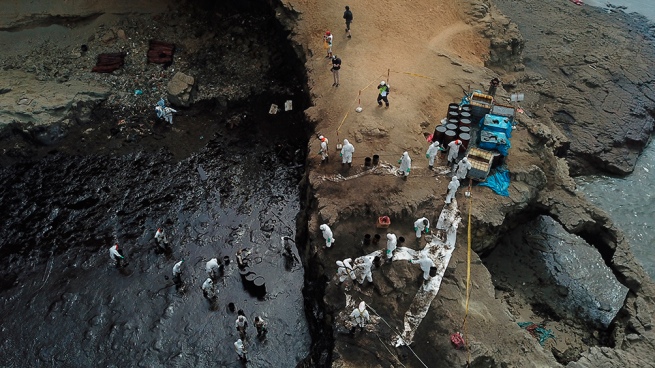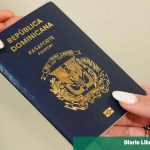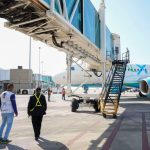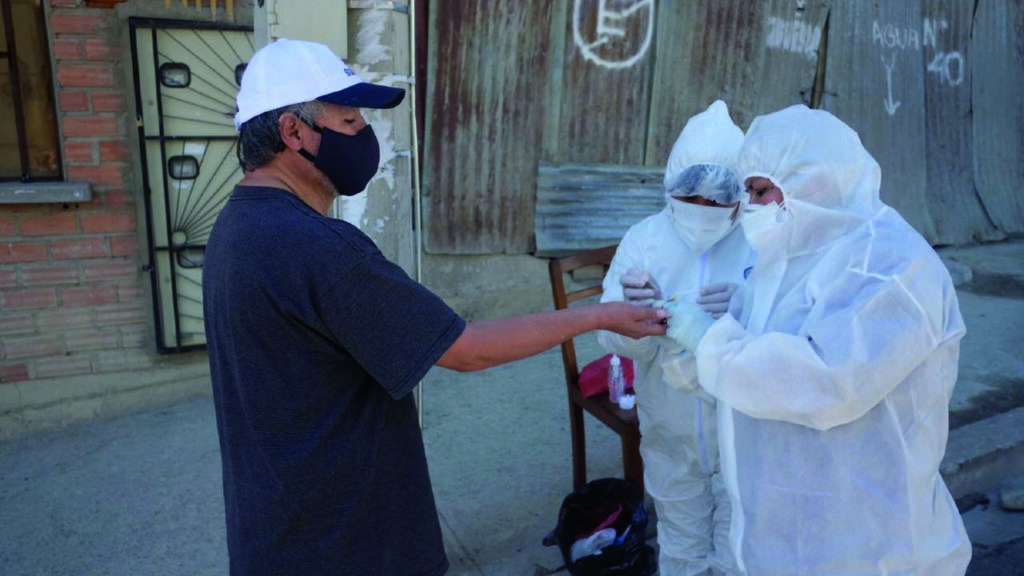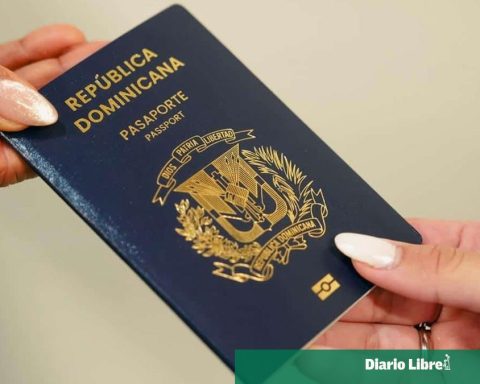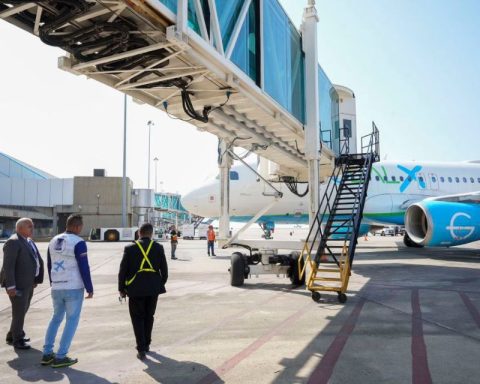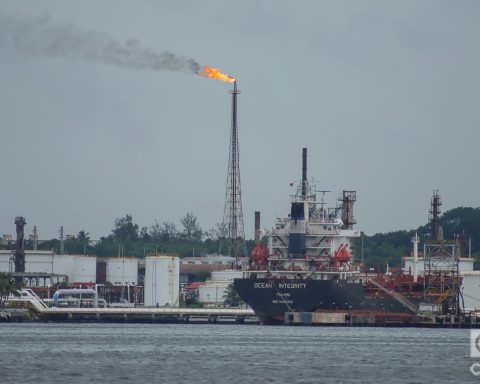Peru declared this Saturday “environmental emergency” for 90 days to the coastal area damaged by the spill of 6,000 barrels of crude a week ago in the midst of the waves caused, they argue, by the volcanic eruption in Tonga.
With this measure, the government foresees a “sustainable management of the affected territories”, with the respective “recovery and remediation work” to mitigate contamination.
The Ministry of the Environment justified the “emergency” in that the spill “constitutes a sudden event with a significant impact on the coastal marine ecosystem of high biological diversity” as well as “a high risk to public health.”
? @RubenJ_Ramirez_:”As a result of this spill, marine biodiversity and coastal areas have been affected, reaching 21 beaches between Ventanilla and Ancón.” #PeruGenerationOfChange #ClimateEmergency pic.twitter.com/Non0SZnLDk
– Ministry of the Environment ??♻️ (@MinamPeru) January 22, 2022
The emergency declaration indicates that the execution of the immediate and short-term action plan is in charge of the Spanish oil company Repsol, owner of the La Pampilla Refinery terminal, located in the Ventanilla district of the province of Callao, near Lima, where the disaster occurred, said a dispatch from the AFP agency.
The Peruvian government gave Repsol a timetable for 10 days to comply with all cleaning and decontamination actions.
The spill occurred on Saturday, January 15, during the unloading process of the Italian-flagged ship “Mare Doricum” loaded with 965,000 barrels of crude oil.
? @RubenJ_Ramirez_:”An Environmental Crisis Committee has been formed with: @MinemPeru, @CancilleriaPeru Y @MINPRODUCTION. We have continued to meet with #Repsol, together with congressmen, in order to articulate the dialogue with the company and fishermen”. pic.twitter.com/WwZKnGJ9Ve
– Ministry of the Environment ??♻️ (@MinamPeru) January 22, 2022
According to the Spanish company, the spill occurred in the midst of abnormal waves caused by the volcanic eruption in Tonga.
Repsol claims not to be responsible for the incident, since the Peruvian maritime authorities did not issue warnings about a possible increase in waves due to the eruption.
Peru demanded last Wednesday that Repsol “compensate” for the damage caused by the spill of 6,000 barrels of crude oil.
? @RubenJ_Ramirez_: “We continue working, taking veterinary doctors through the @Sernanp, to care for the animals in the area. Our specialists are qualified for these emergencies.” pic.twitter.com/nnhY8VmTKl
– Ministry of the Environment ??♻️ (@MinamPeru) January 22, 2022
According to the analysis of the authorities, the spilled oil moves with the ocean current in a northerly direction.
Indeed, the oil has already spread along the coast to more than 40 kilometers from the refinery, causing the death of various marine species and affecting 21 beaches, according to the Ministry of Health, which recommended that people not go to they therefore have an “unhealthy” rating.
Likewise, the Islotes Grupo de Pescadores zone is affected, which belongs to the National Reserve of the System of Guaneras Islands, Islets and Points, “in approximately 512 hectares”, as well as to the Ancón Reserved Zone “in 1,758 hectares”.
? Also, he said that the @OEFAperu monitors the impacted area permanently, since Sunday, January 15. For its part, @SERNANP organizes brigades with the support of university students for rescue actions and recovery of marine species.#ClimateEmergency pic.twitter.com/e2fB51JwWE
– Ministry of the Environment ??♻️ (@MinamPeru) January 22, 2022
The Spanish company reported this Saturday that 2,384 cubic meters of “compromised sand” have already been removed in the cleanup operation in which more than 1,350 people participate, in the contaminated marine and terrestrial areas, including 14 beaches.
The AFP confirmed that on Cavero beach, in Ventanilla, brigades of workers from the Ambipar company, contracted by Repsol, clean crude-impregnated rocks with cloths that absorb the hydrocarbon but not the water.
? Minister Rubén Ramírez: “Oil spill in Ventanilla is an environmental, social and humanitarian disaster”.
✅ This is how he held it during his presentation in a joint session of parliamentary commissions.
? More info ➡️ https://t.co/Xsx34RHk9H#PeruGenerationOfChange pic.twitter.com/6sPIuVQwxp– Ministry of the Environment ??♻️ (@MinamPeru) January 22, 2022
According to the oil company, 90 pieces of machinery have been used in the affected area, “including 46 heavy vehicles on land and 13 larger vessels,” as well as “7 skimmers (marine cleaning machines), 6 floating tanks, 3 recovery and more than 2,500 meters of containment barrier”, hoping to double the number of barriers “in the next few days”.
Repsol assures that “it is deploying all efforts to respond to the remediation of the spill.”
During the week there were several protests by fishermen and residents of Ventanilla, concerned about the impossibility of developing fishing or maintaining tourist businesses such as restaurants, before the beaches closed by the emergency.
The spill on the central Peruvian coast left a gloomy balance
Dead birds floating in the sea or covered in oil on rocks unable to fly, while fishermen cannot work on the docks.
“In full swing they have cut off our arms,” fisherman Bernardo Espinoza tells AFP uneasily, noting that he and his colleagues were unable to work in the middle of the southern summer, the time when they traditionally sell more fish.
“We cannot work (…), we have already been taking out the last resources (savings), the last ones, we are already doing what we can,” adds Espinoza, a fisherman for 50 years in Ancón Bay, 45 km to the north. from Lima.
Cleaning brigades replaced bathers in Ancón and other popular Peruvian resorts.
The AFP verified the enormous oil stains on the surface of the sea and dead birds floating in the water, on a tour of Ancón Bay aboard the “Rey de Petita” boat, which before the spill took tourists for a ride.
“They have attacked wildlife and life, (and) the work, of what is the fisherman“said Rodney Vásquez, 30, the captain of the small boat, who has lived his whole life near the sea and is the son of a fisherman.
For his part, the fisherman Alfredo Roque indicated that the difficulties for fishing in this area will last a long time.
“The young (of fish) are already dead; the young, most of them eat on the sea shore, and the sea shore is full of oil”he explained.
In addition to the fishermen, other people who lived from activities linked to the beaches were left without income: restaurant owners and employees, those who rent umbrellas and those who sell food and soft drinks to bathers.
On the Ancón pier, only the crew members of larger vessels that fish on the high seas continue to work, while the fish stalls are empty, because there are no longer any customers.
“Nothing is sold (…), the fish more than anything comes out with the smell of oil, and people don’t buy, they don’t consume because they are afraid of getting intoxicated”, indicates Giovana Rugel, 52, who sells fish at the entrance to the Ancón pier.
